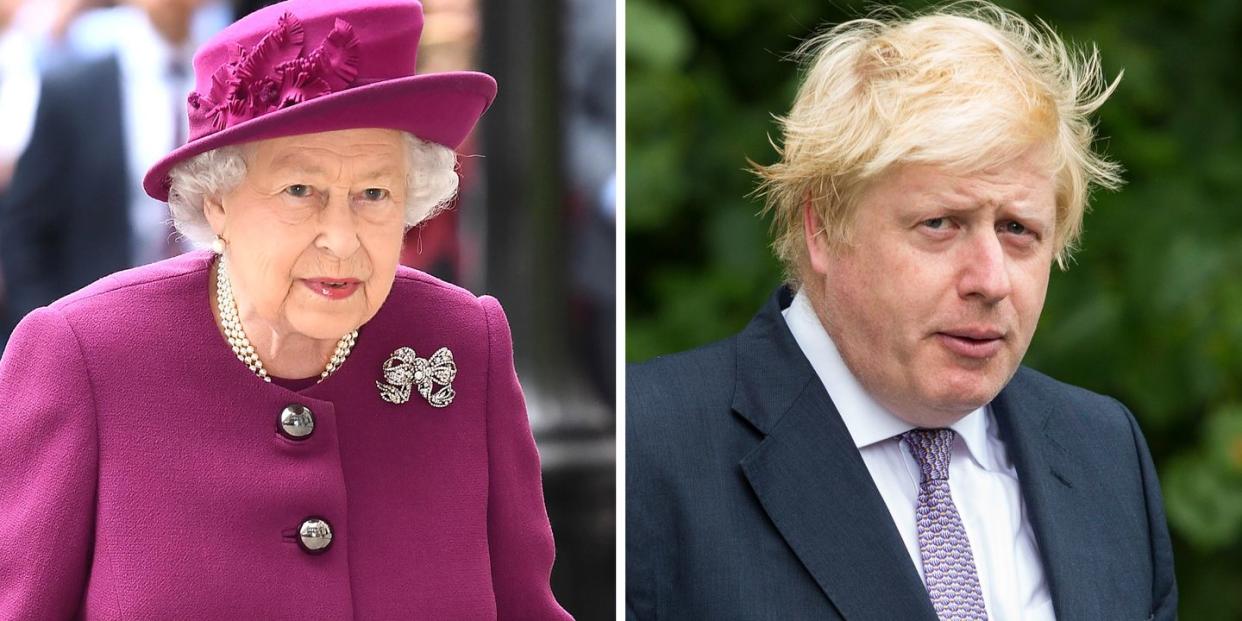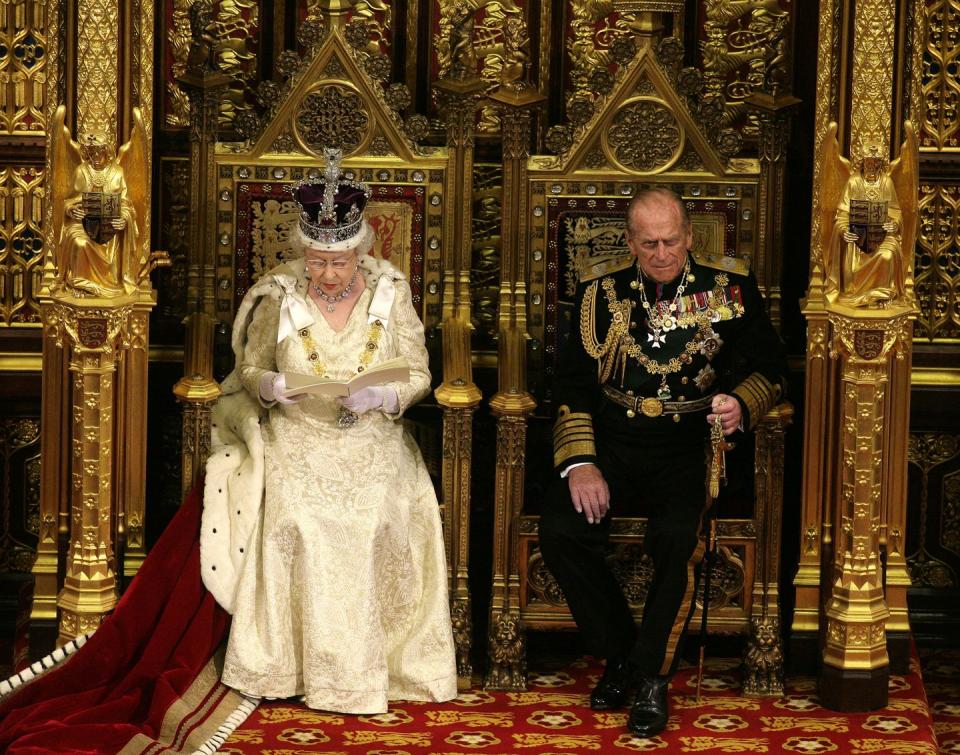Queen Elizabeth II Approves a Suspension of Parliament amid Brexit Controversy

At the request of Prime Minister Boris Johnson, Queen Elizabeth II has agreed to prorogue Parliament, suspending the function of the legislative body for five weeks.
The move brings the monarch closer to the Brexit controversy, which has been rumbling in Parliament for months.
Parliament has until October 31 to prevent a no-deal Brexit. This suspension severely cuts back the time opposition lawmakers can work on a deal. If Brexit goes through without a deal, it could spell disaster for the British economy.
Today, Queen Elizabeth II approved Prime Minister Boris Johnson’s request to prorogue, or suspend, Parliament. The move comes at a heightened moment of controversy, in which the monarch teeters on the brink of entering a national political maelstrom.
The suspension cuts down the legislative body's session by five weeks, impeding lawmakers’ abilities to prevent a no-deal Brexit. Parliament has until Halloween to keep the nation from exiting the European Union without a deal; if no deal is made, Brexit could have disastrous economic consequences for the United Kingdom.
The prime minister, however, has denied that he requested a Parliamentary suspension specifically to force through a no-deal Brexit. “The decision to end the current parliamentary session—the longest in close to 400 years and in recent months one of the least active—will enable the Prime Minister to put a fresh domestic program in front of [members of Parliament] for debate and scrutiny while also ensuring that there is good time before and after the European Council for Parliament to further consider Brexit issues,” Downing Street said in a released statement.
The Queen has approved the suspension of Parliament for around five weeks, severely hampering MPs’ efforts to stop Prime Minister Boris Johnson going ahead with a no-deal Brexit. pic.twitter.com/YPLZMisHvh
— Richard Palmer (@RoyalReporter) August 28, 2019
So, what exactly does this all mean? We'll break it down for you.
What exactly is a “no-deal Brexit”?
Since the U.K. voted to exit the European Union in 2016, the country has struggled to find a way to disentangle itself from the EU. Doing so is messy business. To withdraw, the U.K. must extract itself from pacts under the union that affect trade, migration, customs, tariffs, and more. Theresa May, Johnson’s predecessor, resigned from her post after three failed attempts to have Parliament accept her withdrawal negotiations. Multiple reports have found that leaving the EU without an exit plan in place could wreak havoc on the British economy. Consequences could include having to construct from scratch trade agreements with major trading partners like the United States. That process could take years.
What does it mean to "prorogue" Parliament?
When a monarch prorogues Parliament, the current parliamentary session ends, meaning that all motions that have yet to be addressed, voted on, or passed are also suspended. It is possible, however, for such motions to be reintroduced in the next session—either through a member of Parliament or through a motion made in the previous session. The current Parliamentary session has been running since June of 2017.
Can the queen actually suspend a session of Parliament?
Yes—in fact, it's one of the monarch's formal duties. While the queen must remain politically neutral as the Head of State (this also means she can't vote or run for election), her role includes exercising the right to prorogation, appointing the prime minister, "opening each new session of Parliament, granting Royal Assent to legislation, and approving Orders and Proclamations through the Privy Council," according to the royal website. Her relationship with the British government is purely ceremonial.
Why would a monarch suspend Parliament?
To suspend Parliament, the prime minister must acquire the assent of the British sovereign. While monarchs once exercised their power of prorogation to advance their own political purposes, the role of the modern monarch has become much more of a formality, which is why the sovereign usually approves all requests for a Parliamentary suspension. However, Prime Minister Johnson’s request comes at a particularly fraught moment for the U.K., and brings the queen, who is supposed to serve as a neutral party, closer to the political controversy consuming the nation.
Traditionally, a monarch’s consent to a Parliamentary suspension comes at the advice of the Privy Council, or a formal body of advisers. A suspension also usually precedes the Queen’s Speech, when the queen officially opens the session of Parliament and declares the government’s coming agenda in front of the legislative body. Three Conservative members of the Privy Council met with the queen today on behalf of Johnson at Balmoral Castle in Scotland. Following Her Majesty’s approval, the Queen’s Speech will fall on October 14, after which Parliament will reconvene.

Can the queen’s agreement to the suspension be legally challenged?
The queen’s prerogative powers—which, in addition to proroguing Parliament, include appointing the prime minister and the granting of honors—cannot be legally challenged, BBC reported. Still, it’s possible to mount a legal challenge to the counsel the prime minister gives her. A judicial review of the prime minister’s advice to the queen could result in ruling whether or not the advice was lawful.
Some members of Parliament have already appealed to a court in Edinburgh in hopes that the ruling will block the legislative shutdown.
How have people reacted to the suspension?
The queen’s approval of Johnson’s plan will cut down Parliament’s legislative session by five weeks, the longest suspension for the body since 1945, according to The Guardian. Members of Parliament already had limited time to stop the no-deal Brexit, but this suspension could fatally disrupt any legislative effort against it.
Critics lambasted Johnson’s plan, calling it undemocratic and a constitutional crisis. Jo Swinson, leader of the anti-Brexit party Liberal Democrats, requested a meeting with the queen after Johnson announced his intention to suspend Parliament. “This is a crucial time in our country’s history, and yet our Prime Minister is arrogantly attempting to force through a No-Deal Brexit against the democratic will,” she said in a statement. “He is outrageously stifling the voices of both the people and their representatives.”
Today @joswinson has written to Her Majesty the Queen to ask for a meeting following the reports that the Government is expected to suspend Parliament from mid-September. Boris Johnson is outrageously stifling the voices of both the people and their representatives. pic.twitter.com/euIZqkvzCw
— Lib Dem Press Office (@LibDemPress) August 28, 2019
Yvette Cooper, a member of Parliament who opposes a no-deal Brexit, tweeted, “Boris Johnson is trying to use the Queen to concentrate power in his own hands - this is a deeply dangerous and irresponsible way to govern.”
Boris Johnson is trying to use the Queen to concentrate power in his own hands - this is a deeply dangerous and irresponsible way to govern https://t.co/UEn1isXbSp
— Yvette Cooper (@YvetteCooperMP) August 28, 2019
John McDonnell of the Labour Party, which also opposes a no-deal Brexit, went so far as to call Johnson’s move a “British coup.” He tweeted, “Whatever one’s views on Brexit, once you allow a Prime Minister to prevent the full and free operation of our democratic institutions you are on a very precarious path.”
Make no mistake, this is a very British coup. Whatever one’s views on Brexit, once you allow a Prime Minister to prevent the full and free operation of our democratic institutions you are on a very precarious path. https://t.co/9kwmw8i6E1
— John McDonnell MP (@johnmcdonnellMP) August 28, 2019
An online petition against Parliament’s suspension quickly gained hundreds of thousands of signatures. It asks to not suspend the body until the Brexit deadline is either “sufficiently extended or the U.K.’s intention to withdraw from the EU has been cancelled.”
Parliament will return from a summer recess on September 3.
You Might Also Like

